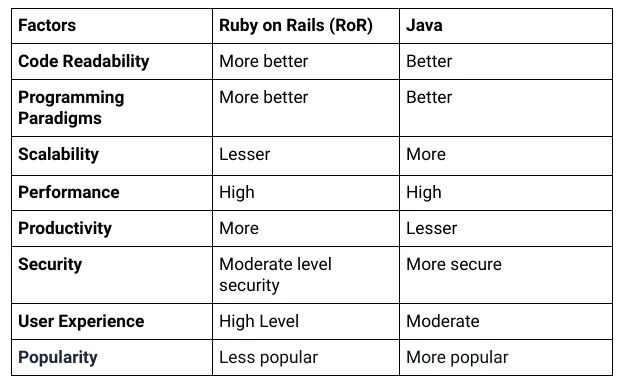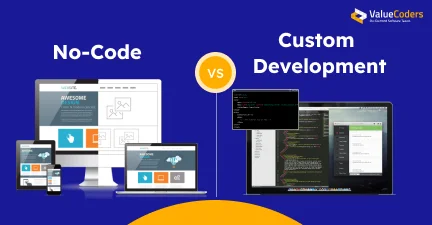Choosing the appropriate technology for your web app development is as tricky as picking up your comfy sofa chair for your sweet home; for this, you might have to try different variants before you find the right one. The same goes for the technology selection, whereas Ruby on Rails and Java are the two best programming languages when it comes to web application development, but still, it’s a mystery which one is the best.
To help you disclose this mystery here in this article, we have compared both programming languages Java and Ruby on Rails. So let’s begin and know who will be the winner of the unrevealed mystery game Ruby on Rails vs Java.
What is Ruby on Rails?
Ruby on Rails is an open-source web application framework that runs on the Ruby programming language. It follows the MVC architectural pattern, which helps in dividing an application into three parts: model, view, and controller. Since different individuals handle different aspects, thus, this makes it simple to develop and maintain an app.
David Heinemeier Hansson developed the framework “Ruby on Rails” in the year 2004.
It simplifies web development to a considerable extent, allowing the use of fewer lines of code for creating application features.
1,062,459 live websites using Ruby on Rails, additionally 2,983,372 sites used it historically.
Airbnb, Crunchbase, Bloomberg, Dribble, GitHub, Fiverr are the named companies using Ruby on Rails.
Ruby on Rails can be a better choice to develop a web application, and this technology can be used efficiently when you will hire Ruby on Rails developer India from the best Ruby on Rails development company.
Accelerate your web application development with our Ruby on Rails expertise
What is Java?
Java is a general-purpose programming language that is concurrent, class-based, and object-oriented. James Gosling developed the Java language in the year 1995. Java runs on JVM (Java Virtual Machine), which helps run any compatible independent software written once but again uses it many times over without changing even bytecode.
Moreover, Java is one of the most famous languages for web applications that run on the server-side and use the Java EE platform.
9943 corporations reportedly use Java in their tech stacks, including Google, Uber, and Airbnb.
1,051,164 live websites using Java, additionally 3,669,470 sites used it historically.
If you are pondering developing web applications using Java technology, then get connected with one of the best Java development companies to hire Java developers in India. This will help you out in making adequate use of Java core features and functionalities.
Pros and Cons of using Java and Ruby on Rails
There are positive & negative sides to both the programming languages Ruby on Rails and Java. We have discussed their pros & cons to make it easier for you to choose between them, which one is better?
Pros of using Ruby on Rails
- Ruby on Rails is easy to learn for beginners and has a thriving community that helps in resolving any query.
- The MVC architectural pattern followed by RoR makes it easier to develop and maintain an app as different aspects can be handled by different individuals.
- Lots of gems (Ruby libraries) are available, which make development quicker and easier.
RoR applications are typically more stable and secure as compared to Java ones.
These apps are also featured with the standard features like inbuilt testing and deployment.
Pros of using Java
A robust, secure, and scalable language that works on all platforms (web or mobile).
- A flexible and dynamic language, allowing you to make changes as per requirements.
- Java uses lesser lines of code for creating application features which makes it easier to read and understand the code itself.
- Android app development is done using the JVM that helps in running any compatible independent software with no change, even in bytecode.
Cons of using Ruby on Rails
- Ruby on Rails is slower as compared to Java.
- The code written in RoR might not be as efficient as the code written in Java.
- RoR apps are not stable and might crash on high load.
Cons of using Java
- It’s a complex language that is harder to learn for beginners.
- There is no support from the programming community like Ruby on Rails which makes it difficult to solve issues by self.
- There is no inbuilt testing feature available for Java; one has to depend on a third-party tool.
Also read: What Is Java Used For? 9 Things You Can Create
Ruby on Rails vs Java: Similarities and Dissimilarities
There are various similarities & dissimilarities between Ruby on Rails and Java. Let’s take a glimpse at some of them:
Similarities between Ruby on Rails and Java
Both are open-source frameworks.
Java is more popular than Ruby on Rails in the enterprise world, but it’s not applicable for low-traffic websites due to its memory requirement of about 150MB. At the same time, Ruby on Rails can work with 16 MB RAM and very less processing power.
Ruby on Rails uses the MVC pattern while Java follows the model view controller pattern.
Both have large community support and IDEs to provide multiple tools for editing, refactoring, debugging, etc.
Dissimilarities between Ruby on Rails and Java
Java is an easy-to-learn language, while Ruby takes time for coding as it has various syntaxes; hence beginners find it difficult with it.
Java runs on the server-side and uses the JVM, but Ruby has a faster execution speed as it compiles into native machine code before running, thus making it easier to debug and deploy with fewer configuration changes for OSs.
Although both have various similarities and dissimilarities, Ruby on Rails is better when it comes to web development as it has a more concise syntax, follows the MVC pattern, and helps in dividing an application into three parts. Also, due to its popularity amongst developers, there are a number of online resources and support communities available for Ruby on Rails.
So if you’re looking forward to developing web applications, then you should hire Ruby on Rails developers in India as the demand is very high for RoR web app development.
Moreover, the Java application development process can be easier and hassle-free for your business, and for this, you just need to hire dedicated Java developers working in the top-rated Java web application development company.
Ruby on Rails or Java for Web App Development?
Ruby on Rails vs Java: Which one to choose?
As both Ruby on Rails and Java are used for web application development, it’s often difficult to decide which one is the best. However, when it comes to picking up between these two programming languages, there are certain factors that can help you choose what suits your business needs better than others.
Let us discuss some of them below:
Code Readability
In Ruby on Rails, there is a practice of using Gems for extending its functionality, whereas, in Java, it’s possible to add libraries and frameworks. Some programmers find the former approach more useful as gems are easier to understand with the documentation provided. However, some others believe that adding new code or libraries might cause conflicts that can be difficult to debug.
Thus, it can be said that code readability is better in Ruby on Rails when compared to Java.
Programming Paradigms
Ruby on Rails (RoR) follows the Model View Controller (MVC) architectural pattern, which helps in dividing an app into 3 parts: model, view, and controller. This makes it more simple to develop and maintain an app as different aspects can be handled by different individuals. Java also supports MVC but doesn’t enforce it.
Thus, Ruby on Rails is more suitable for those who are looking for a programming paradigm that enforces separation of concerns.
Community and Support
RoR has a large and active community that helps in resolving issues and queries related to the language very quickly. The Java community is also quite big but might not be as supportive as the Ruby community.
Thus, when it comes to support and help in times of need, Ruby on Rails is much better than Java.
Scalability
Scalability is found to be equal for both programming languages because both are based on MVC patterns. However, if you are looking for frameworks that specifically support scalability, then Java can be the edge over Ruby on Rails.
Performance
“Ruby on Rails” language is often criticized for its poor performance as compared to Java. However, with the release of Ruby on Rails version five, there is no more issue with this language.
Thus, in terms of overall performance, both Java and Ruby on Rails are neck-to-neck.
Popularity
Java is an older programming language but is still very popular. Ruby on Rails, in comparison, might be a little less popular than Java, but it’s gaining traction at a rapid pace. Moreover, there are many websites built on the Ruby on Rails framework as compared to Java, so the popularity of this web development framework is increasing day by day.
Thus, Ruby on Rails is gaining popularity faster than Java and might soon become the most popular programming language.
Productivity
Ruby on Rails is a little slower when compared to Java, but it’s much more productive. Developers can build an app quickly with fewer errors as it supports rapid application development.
Thus, there are many factors like productivity support for complex tasks, built-in libraries, and community support that make Ruby on Rails a better choice for web application development
Security
Java is more secure than Ruby on Rails as it has a larger community and better resources. Moreover, Java has been designed for enterprise applications and hence is more robust when it comes to security.
Thus, if security is your primary concern, then Java would be the better choice over Ruby on Rails.
User Experience
With the help of Ruby on Rails, it’s possible to build an app with a great user experience. It also supports rapid development so that users get faster results and interaction. Java is not as good in this aspect but can still be made responsive enough for apps or websites.
Thus, there are many features like speed, ease of development, and responsiveness that make Ruby on Rails a better choice for user experience.
Also Read: Java vs JavaScript: Which Is A Better Choice?
Ruby on Rails vs Java: Comparison Table
Ruby on Rails is a better programming language than Java when it comes to web application development. It has a large & active community that provides quick support in times of need, is more productive, and supports rapid development.
Java might have the edge over Ruby on Rails when it comes to performance, but the difference is not too significant anymore. Security is another area where Java outperforms Ruby on Rails, but the latter is catching up fast. Lastly, user experience is where Ruby on Rails clearly wins over Java.
So if you are looking for a web development framework that offers great performance, security, and productivity along with an amazing user experience, then Ruby on Rails should be your go-to choice.
Ruby on Rails vs Java for Web App Development - Making the Right Call
Final Thoughts
Java is a better option for larger and more complex projects, while Ruby on Rails is perfect for small startups or businesses that are looking to reduce the cost and time of development.
Moreover, at last, I will say that according to the business needs and project type, both Ruby on Rails and Java (Ruby on Rails vs Java) can act differently as in some cases, Java can be far better than Ruby and rails and the same goes with Ruby on Rails (RoR).
If in case you are thinking to use RoR for web app development, I will suggest you take support from Ruby on Rails programmers and the same for Java; if you are using Java in application development, then it will be great and profitable to hire java developers in India working in top-notch web application development company (ValueCoders).







